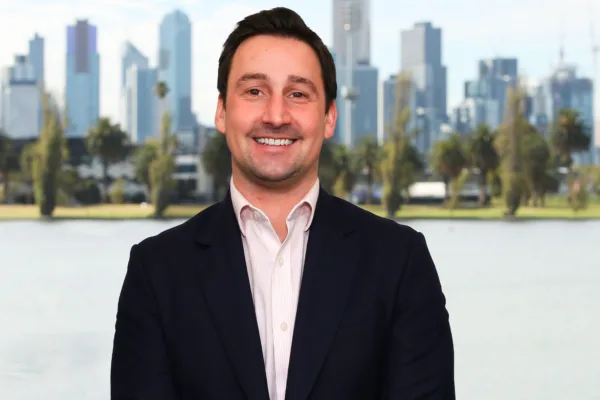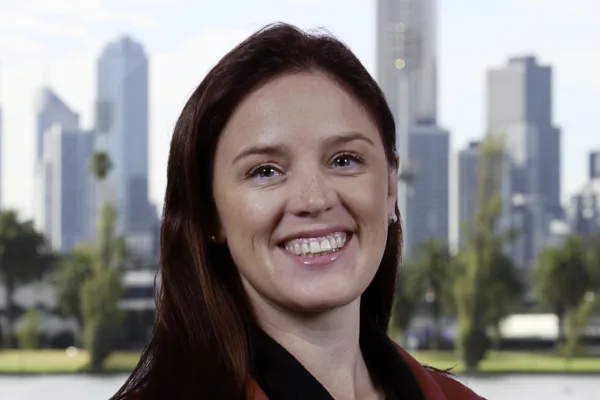Back
The Engine Room: Mia La Burniy
Thursday, 5 November 2020
Mia is incredibly excited to be leading a number of change management projects within AGPC which are progressive and demonstrate that the organisation is a frontrunner for driving social change
‘The Engine Room’ aims to build the profile of Australian Grand Prix Corporation (AGPC) staff members and provide interesting insights into what it is like to be part of the team working on two iconic international events, the Formula 1® Australian Grand Prix in Melbourne and the Australian Motorcycle Grand Prix in Phillip Island.
Mia La Burniy - Division Manager, Strategy & Projects and Legal Counsel
1. Prior to joining the Australian Grand Prix Corporation (AGPC) in 2017, you worked as a lawyer in professional services, what made you want to transition into the major event and sporting industries?
To put it simply, I’ve always loved sport. When I was in law school, I thought it would be amazing to be a lawyer in sport – I remember researching “how do you become a sports lawyer?” What I realised is that these opportunities are scarce and highly sought after. So, I set about building a career plan and worked hard to make it happen.
I started my legal career at a top-tier law firm to fine tune my craft as sound legal skills are the foundation of every successful lawyer. I quickly discovered that the law firm life wasn’t quite for me and I transitioned across to working as in-house counsel for KPMG. My time at KPMG provided me the opportunity to broaden my commercial knowledge and encouraged me to be inquisitive. It also highlighted the positive impact I could have on the success of the business by tailoring my legal advice to fit in with the commercial outcomes of the business and not the other way round. It was at KPMG that I built a reputation for delivering accurate, timely and solution-centric advice and I approached every opportunity with dedication and passion, ensuring the work and advice I delivered was of a high quality. These are traits I still pride myself on today.
In 2017, the Legal Counsel role at AGPC presented itself and while I still count myself as lucky to have landed the opportunity, I was confident that I had developed a legal and commercial skill set that set me apart from other candidates.
2. Since working at AGPC, you’ve had three diverse roles as a commercial lawyer, strategy leader and international consultant, how did you implement these growth opportunities?
My role as Legal Counsel provided me touch points across the business, which I was able to leverage to quickly develop an understanding of the internal workings and priorities of each department and drive commercial outcomes. This helicopter view provided me with opportunities to work on tasks which did not fit squarely within the traditional remit of a lawyer and ultimately made the transition to leading AGPC’s strategy and driving big-picture thinking the natural next step.
The international consulting opportunity on the other hand felt like it came from left field. Consulting wasn’t a career path I had previously considered let alone on a project as enormous as an inaugural Formula 1® event. I certainly didn’t think I was compatible with Gantt charts and project programs! It would be misleading of me to suggest that the transition went smoothly, there were more “what am I doing?” and “what if I fail?” moments than I can count. However, with the reassurance and support of Ashley Davies, International Consulting Project Director and James Rosengarten, General Manager of Legal & Strategy, and a reacquaintance with my love of problem-solving, I took each challenge in my stride and embraced the uncertainty – and I couldn’t be more proud that I did!
My ability to identify a task at hand, develop a scope / plan and structure to achieve an outcome, coupled with my ability to influence others and identify who the right person was to implement the desired outcome - skills I honed in my training as a lawyer - provided me with a really strong foundation to become a successful consultant.
My international consulting role saw my professional skills grow exponentially. I cultivated an extensive knowledge of operational strategy, delivery and planning, developed strong stakeholder management capability and honed my risk identification, management and mitigation strategies. I’m lucky in that both Ashley and James have always trusted me with what needs to be done and encouraged me to make decisions. I’ve always felt that I’ve had the autonomy to be able to successfully do my job, learn from my mistakes and trust my own judgement.
The opportunities I’ve had at AGPC have no doubt influenced how I think about things -
I’ve got broad commercial and legal experience under my belt, which means I bring a different perspective to the table and facilitate better outcomes.
3. You won the AGPC Maryiana Burela Employee of the Year Award in 2018, what were your key takeaways from the study trip you embarked on?
The Maryiana Burela Employee of the Year Award is an annual award presented to AGPC’s employee of the year. The coveted award is named after an inspirational former employee of AGPC and which sees the winner undertake a self-directed professional development trip.
There were two core objectives of my trip; (1) further my knowledge of sports strategy through fostering grassroots participation and breaking down barriers to participation, investing in and growing a year-round presence for our events and understanding the future trends of fan engagement, and (2) further my understanding of the future of sports consumption, focusing on opportunities for non-traditional broadcast and digital over-the-top content, which culminated in me attending the London Leaders Week Conference.
My learnings from my trip are too extensive to list here, but there are three key themes I have brought back to AGPC:
1. The importance of living out your corporate values. Partners and fans are looking to support events that not only provide an experience, but also give back to the community – catering for the socially conscious is becoming a real factor for event organisers.
2. Individualism is king. Consumer behaviour and technology have come together to completely personalise the event experience. From smart stadiums that use technology and data to create a convenient and seamless experience, to tailored broadcasts that enable you to watch your favourite sport from the players’ perspective, it all ties back to tailoring your offering to the individual.
3. Rethink return on investment (ROI). For most Australian sport, ROI has always been thought about in terms of the dollar value. But what many of successful franchises are doing is making significant investments where the primary purpose is not to generate direct income but rather unlock potential through data capture or generate change across key social issues such as gender, ethnicity or sustainability.
Not only was it an unforgettable professional learning experience, but as a sports fan, it also provided so many ‘pinch me’ moments. I got to walk the grounds and touch the grass at Lords Cricket Ground, Stamford Bridge and Twickenham Stadium, I talked to the organisers of the Rugby World Cup in Japan and walked on the starting grid at the Japanese Grand Prix.
4. You played a key role in providing strategic and event delivery advice to the promoter of the Vietnam Grand Prix, can you tell us more about your secondment in this role?
AGPC was engaged as a special event delivery consultant to the Vietnam Grand Prix Corporation (VGPC), the promoter of the Vietnam Grand Prix as they prepared to host their first Formula 1® Grand Prix in 2020 in Hanoi. Our role was to advise on every aspect of a Formula 1® event strategy, planning and delivery, resulting in the development of an innovative, but thoroughly in-depth master plan and timeline to achieve key event deliverables.
I led a team from the Melbourne office who was responsible for the implementation of the master plan and keeping the promoter on track and creating over 100 information packages that spanned every aspect of hosting a Formula 1® event including marketing and sales, infrastructure, event operations, motorsport, entertainment, risk management and governance.
Within a year, my role evolved, and I became an integral member of the in-country consulting team, where I advised VGPC on countless operational and strategy matters. My ability to understand a complex problem, distil it into easily understandable and achievable actions and identify and connect with the right people meant that I could take the lead and successfully deliver outcomes, including in areas where I had little to no experience.
5. Your current role sees you leading a number of strategic projects which benefit not only AGPC but the wider community. Can you tell us more?
I’m incredibly excited to be leading a number of change management projects within our organisation which are progressive and show AGPC is a frontrunner for driving social change, and importantly, challenging common public perception that both the Formula 1® and Motorcycle Grands Prix are “just” motorsport events.
Through championing the AGPC Corporate Social Responsibility Strategy, I’m responsible for ensuring that not only is AGPC a good corporate socially responsible citizen, but that our approach to social change creates wider community benefits through influencing our supply chain, partners, stakeholders and fans.
I’m currently leading the implementation of AGPC’s Social Procurement Strategy which identifies and outlines how AGPC will use its buying power to generate social value and change across regional and metropolitan Victoria. Through this process, I’ve developed the framework through which AGPC will purchase goods and services from social suppliers, have redefined our procurement process to emphasis social value and sustainability requirements and created a toolkit of materials which encourages and introduces our existing long-term suppliers to new-age procurement.
Through AGPC’s commitment to becoming an early adopter of a Gender Equality Action Plan under the Gender Equality Act 2020 (Vic), I am also charged with developing and implementing AGPC’s framework for achieving workplace gender equality and improving the status of women. Gender equality is a personal passion of mine so I’m excited to have the opportunity to define AGPC’s strategies for promoting and facilitating the promotion of women and identifying and eliminating disadvantages faced by persons of different genders.
6. The major events industry is always evolving, especially as we face challenging times during the global COVID-19 pandemic, how do you look strategically plan for the future?
In a COVID-19 world, maintaining a strategic mindset remains as important as ever both in the short term and the long term. The approach I bring to strategic planning is founded on a long-term outlook, which means our approach to strategic planning hasn’t really deviated as a result of COVID-19. AGPC remains committed to embracing technology, innovation and delivering experiences that extend beyond our events, but our expectations as to what this looks in the short-term have certainly changed.
I do think that COVID-19 has presented us with an opportunity to stop and reflect, identify who we are and what’s importance to us as an organisation and consider what we can do differently in a way that is genuine and authentic to AGPC – which is a big positive from a strategic perspective and something I’m excited to be a part of.




